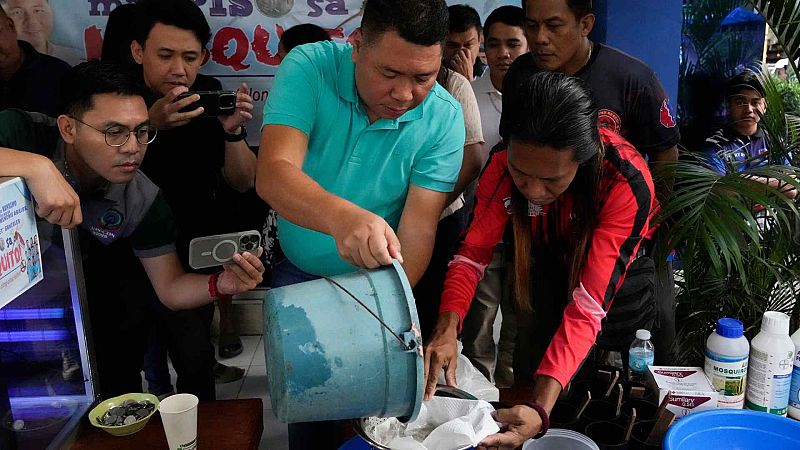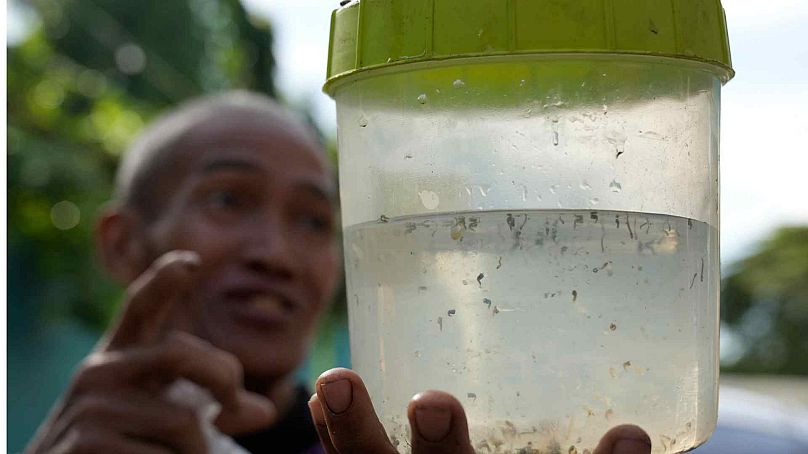Mosquitoes wanted dead or alive: Asian village pays locals to hunt insects after two die from dengue

A village in the Philippines is taking an unusual approach to controlling the local mosquito population - offering financial rewards to anyone who captures them, dead or alive.
Local officials hope that attaching a bounty to the insects will reduce cases of dengue fever, which has killed two young students in the village.
Residents will get a reward of one Philippines peso - just over €1 cent - for every five mosquitos or mosquito larva they turn in.
What is dengue fever?
Dengue fever is a viral infection spread through mosquito bites. While many people will have mild or no symptoms at all, dengue can occasionally cause more severe cases, and even death, according to the World Health Organization.
Dengue is found in tropical and sub-tropical climates worldwide, mostly in urban and semi-urban areas. Addition Hills village in Mandaluyong City is in the densely populated area around Manila, the capital of the Philippines.
A urban village of more than 100,000 residents living in crowded neighbourhoods and residential condominium towers, Addition Hills has so far tried clean-ups, canal de-clogging and a hygiene campaign to combat dengue. But when cases spiked to 42 this year and two young students died, village leader Carlito Cernal decided to intensify the battle.
“There was an alarm,” Cernal told The Associated Press. “I found a way."
Critics warned the strategy could backfire if desperate people start breeding mosquitoes for the reward. Cernal said that was unlikely because the campaign would be terminated as soon as the uptick in cases eases.
'I can buy coffee'
As the mosquito capturing campaign began, about a dozen mosquito hunters showed up at the village office.
Miguel Labag, a 64-year-old scavenger, handed a jug with 45 dark mosquito larvas squirming in some water and received a reward of nine pesos (15 cents).
“This is a big help,” Labag said, smiling. “I can buy coffee.”
Climate change is behind the dengue outbreak
The unusual strategy adopted by Addition Hills reflects growing concern after the nearby city of Quezon declared a dengue outbreak over the weekend. Eight more areas reported an upsurge in cases of the potentially deadly viral infection.
At least 28,234 dengue cases have been recorded in the Philippines this year up to 1 February, a 40 per cent increase compared to the same period last year, according to health department statistics. Quezon City declared a dengue outbreak Saturday after 10 deaths this year, mostly children, out of 1,769 residents infected.
Officials in another village in Quezon City were considering releasing swarms of frogs to eat mosquitoes.
Health Secretary Teodoro Herbosa said it’s crucial to clean up mosquito breeding sites, and for anyone who might be infected to seek immediate medical attention. Despite an increase in dengue infections, the Philippines has managed to maintain low mortality rates, he said.
Dengue cases surged unexpectedly ahead of the rainy season, which starts in June, likely because of intermittent downpours that have left stagnant pools of water where dengue-causing mosquitos can breed, Health Undersecretary Alberto Domingo said, adding that climate change was likely contributing to off-season downpours.
Today


